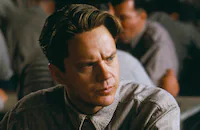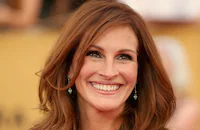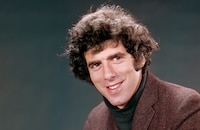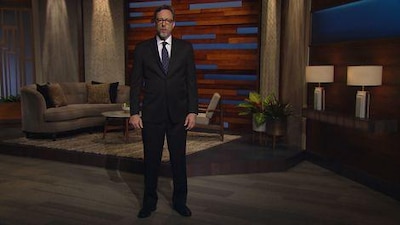The Player

Brief Synopsis
Cast & Crew
Robert Altman
Tim Robbins
Greta Scacchi
Fred Ward
Rod Steiger
Randall Batinkoff
Film Details
Technical Specs
Synopsis
A frustrated screenwriter menaces a studio executive who eventually kills the writer and gets away with murder.
Director

Robert Altman
Cast

Tim Robbins

Greta Scacchi

Fred Ward

Rod Steiger

Randall Batinkoff
Lyle Lovett

Whoopi Goldberg

Sally Kellerman
Marvin Young

Richard Anderson
Scott Glenn
Stephen M. Tolkin

Peter Falk
Jeff Weston
Susan Emshwiller
Sally Kirkland
Gary Busey
Leeza Gibbons

Buck Henry
Dennis Franz
Kathy Ireland

Karen Black
Bert Remsen

Susan Sarandon
Michael Bowen
Natalie Strong
Alexandra Powers

Julia Roberts

Mimi Rogers

Terry Garr
Mike E Kaplan
Kurt Newman

Bruce Willis
Brad Davis
Malcolm Mcdowell

Dina Merrill
Charles Champlin

Dean Stockwell
Brion James
Cathy Lee Crosby
Gina Gershon
Paul Hewitt

Burt Reynolds
Andie Macdowell

Harry Belafonte
Cynthia Stevenson
Jennifer Nash
Vincent D'onofrio
Jayne Meadows
Rene Auberjonois

Lily Tomlin
Peter Gallagher

Marlee Matlin
Jack Riley

Jill St. John
Kevin Scannell
Paul Dooley
John Cusack
Frank Barhydt
Pamela Bowen
Leah Ayres
Thereza Ellis
Guy Remsen

Ray Walston
Richard E. Grant

Felicia Farr

Jack Lemmon

Steve Allen

Elliott Gould

Robert Carradine
Peter Borck
Margery Bond
Adam Simon
Steve James
Shari Belafonte

Sydney Pollack
David Alan Grier

Joel Grey

Robert Wagner
Martin Mull

James Coburn

Nick Nolte
Pete Koch

Cher
Annie Ross
Brian Tochi

Alan Rudolph
Michael Tolkin

Anjelica Huston
Maxine John-james

Jeff Goldblum
Patricia Resnick

Louise Fletcher
Brian Brophy
Joan Tewkesbury
Jeremy Piven
Angela Hall
Kasia Figura
Crew
Steve Allen
Matthew Altman
Stephen Altman
Richard Anderson
Christopher Armstrong
Rene Auberjonois
Alison Balian
C C Barnes
John Beauvais
Harry Belafonte
Shari Belafonte
Bill Bernstein
Andrea Berty
Angela Billows
Karen Black
Angela Bonner
Michael Bowen
Paul Boydston
Charles Bragg
Vicki Brinkkord
Jim Brockett
Cary Brokaw
David Brown
John Brown
Robert Bruce
John Bucklin
Ken Burton
Gary Busey
Scott Bushnell
Thomas Calloway
Robert Carradine
Charles Champlin
Betsy Chasse
Cher
Jim Chesney
Ron Chesney
James Coburn
Stacy Cohen
Celia Converse
Sydney Cooper
Loren Corney
Signe Corriere
Cathy Lee Crosby
John Cusack
Brad Davis
Andrew J. Day
Steve Day
Val Desalvo
Robert Deschane
Paul Dooley
Steve Earle
Thereza Ellis
Susan Emshwiller
John Evans
Kevin Fahey
Michael J. Fahey
Peter Falk
Felicia Farr
Don Feeney
Kasia Figura
Craig Finetti
Jerry Fleming
Louise Fletcher
Dennis Franz
Kenneth Funk
D J Gardiner
Terry Garr
Judy Geletko
Leeza Gibbons
William S. Gilmore Jr.
Scott Glenn
Jeff Goldblum
Rich Gooch
Elliott Gould
Joel Grey
David Alan Grier
Michele Guastello
Robin Hage
Alisa Hale
Sheri Halfon
Bob Hart
John Hartigan
Buck Henry
Julie Heuer
Cynthia Hill
Scott Hollander
Joseph Holsen
Paul Holtzborn
Les Hooper
Kelly Householder
Maysie Hoy
Anjelica Huston
Matthew Iadarola
Kathy Ireland
Steve James
David Jobe
Maxine John-james
Alexander Julian
Lawrence Karman
Stanley Kastner
Sally Kellerman
Sally Kirkland
Jack Kney
Danielle Knight
Justin Kritzer
Cheryl Kurk
Edmund J Lachmann
Deborah Larsen
Darryl Lee
Jack Lemmon
Jean Lepine
Jean Lepine
David Levy
Andie Macdowell
Michael Mark
Chris Marneus
Anthony T. Marra Ii
Marlee Matlin
Pat Maurer
Stuart Mccauley
Malcolm Mcdowell
Tom Mcgrath
Cary Mckrystal
James Mclindon
Jayne Meadows
James Monroe
Thomas L Moore
Don Muchow
Martin Mull
Gerry Mulligan
Milton Nascimiento
Jennifer Nash
Tim Nash
Kurt Newman
Thomas Newman
Allan Nicholls
Nick Nolte
A. Michelle Page
Thomas Pasatieri
Mario Perez
Geraldine Peroni
Dan Perri
John Post
Alexandra Powers
John Patrick Pritchett
Derek Raser
Michael Redbourn
Chris Reddish
Bert Remsen
Guy Remsen
Patricia Resnick
Burt Reynolds
Richard Riggs
Jack Riley
Julia Roberts
Mimi Rogers
David Ronan
Annie Ross
Daniel Rothenberg
Alan Rudolph
Jim Samson
Susan Sarandon
Lorey Sebastian
Kimberly Edwards Shapiro
Joel Shryack
Adam Simon
Emily Smith-baker
Jill St. John
Mike Stanwick
Carole Starkes
Rod Steiger
Wayne Stroud
Lydia Tanji
Joan Tewkesbury
Thayer
Dylan Tichenor
Brian Tochi
Michael Tolkin
Michael Tolkin
Michael Tolkin
Lily Tomlin
Tom Udell
Andrew Varela
John Vigran
Robert Wagner
Greg Walker
Ray Walston
Bill Ward
Catherine Webb
Nick Wechsler
Scott Williams
Bruce Willis
Gregory Willis
Marvin Young
Videos
Movie Clip




Hosted Intro
Film Details
Technical Specs
Award Nominations
Best Adapted Screenplay
Best Director
Best Editing
Articles
The Player -
In retrospect it seems like a perfect match between director and material, the great anti-Hollywood filmmaker ("they sell shoes and I make gloves," was Altman's famous description of working within the system) directing a savage satire of the whole culture of modern moviemaking, but he was not the first choice. Producer David Brown had optioned the novel by Michael Tolkin, a screenwriter in his own right who channeled his frustrations of how the system kills the creative spirit into a story where a studio executive literally murders a writer, and sent Tolkin's script around. As directors passed or priced themselves out of contention it was eventually passed to Altman, who was busy trying to get his dream project, an adaptation of Raymond Carver stories with the working title "L.A. Short Cuts," off the ground. Altman had commitments from a number of actors but couldn't raise the financing so he took it on. "I was a director for hire. I needed the job; I saw it as an easy shoot. I kinda like the idea of it, so I did it."
Altman cast Tim Robbins, who had signed on to his Carver film, in the lead as Griffin Mill, an ambitious studio executive in the middle of a power struggle when he starts receiving threatening postcards (and worse) from an anonymous screenwriter. It was Altman's idea to ground the film in the real Hollywood by populating it with real-life stars, writers, and directors in cameos and bit parts, like he had with Elliot Gould and Julie Christie in Nashville but on a much bigger scale. Against these star cameos would be the fictional characters of the story, played (for the most part) by rising talents who had not yet become major celebrities. For these leading roles he cast Peter Gallagher (as Griffin's rival), Fred Ward (the studio's swaggering head of security), Cynthia Stevenson, Vincent D'Onofrio, and Greta Scacchi, plus Whoopi Goldberg and singer Lyle Lovett (in his first screen role) as police detectives and Dean Stockwell and Richard E. Grant as filmmakers pitching a "serious" project to Griffin.
For the cameos, he reached out to the actors who had committed to his Carver film then expanded the list, contacting anyone he thought might be game for showing up for a day or two at scale. As the word got out, more and more Hollywood veterans agreed to appear, some even approaching Altman themselves. "It became a thing to do," remembers assistant producer David Levy. 65 stars and Hollywood veterans ultimately appearing in the finished film, from Steve Allen and Harry Belafonte and Cher to Burt Reynolds and Julia Roberts and Bruce Willis, all of them donating their salaries to the Motion Picture Home. Their parts were almost entirely improvised, including the pitches that writers Buck Henry, Alan Rudolph, and Joan Tewkesbury deliver in the opening shot of the picture, an impressive, elaborate long take that references Orson Welles' Touch of Evil yet is quintessentially Altman as it peaks through windows, eavesdrops on conversations, and observes the film studio culture.
In fact, Altman improvised most of the dialogue throughout the film, much to the frustration of Tolkin, who complained that he didn't recognize any of the lines when he watched the dailies (screenings of the footage shot each day). It was standard working procedure for Altman. "A script to me is just a tool, just a reminder as to what kind of picture you've decided to make," he explained to David Thompson. "I feel it's my obligation to try and take the elements that have been gathered together--actors, the props and the weather--and do something like the scene in the script. But I don't try to make the script; I try to make the film knowing that I have the script as a platform, something to fall back on." For such a sprawling canvas, Altman directs with a clarity and wit that recalls his seventies masterpieces, and he brings the satirical sensibility of a veteran who's been through the Hollywood ringer and come out alive. "What we show in The Player is very, very soft indictment of Hollywood, an unrealistic look at that arena," insists Altman. "Hollywood is much crueler and uglier and more calculating than you see in the film." In fact, for all the cynicism and politics of the portrait, he creates a lively, bustling film with likable, compelling characters and interesting scenes of negotiations, power plays, and subterfuge.
The film became the talk of Hollywood and earned Best Director and Best Actor (for Tim Robbins) awards at the Cannes Film Festival in 1992. It was nominated for three Academy Awards, won two Golden Globes, and topped Best of the Year polls and film critics' awards. It was hailed as Altman's comeback (though he insists he never went anywhere) and its success gave new life to his Carver project, which became Short Cuts and featured many of the actors from The Player.
For all his frustrations with the liberties that Altman took with his script, Tolkin credits him for the film's success. "I can look back and say that he changed my life," he confessed. "The Player as it is, as a cultural object, exists because of Altman and what he brought to it."
Sources:
Altman on Altman, ed. David Thompson. Faber and Faber, 2006.
Robert Altman: The Oral Biography, Mitchell Zuckoff. Alfred A. Knopf, 2009.
Audio commentary for The Player by Robert Altman, Michael Tolkin, and Jean Lépine. Criterion, 1992.
IMDb
By Sean Axmaker

The Player -
Quotes
Trivia
Miscellaneous Notes
Robert Altman was nominated for the Directors Guild of America's 1992 Outstanding Directorial Achievement Award.
Voted Best Picture of the Year (1992) by the New York Film Critics Circle. Also cited for Best Director and Best Cinematography.
Released in United States Spring April 10, 1992
Released in United States on Video March 31, 1993
Released in United States 1992
Released in United States April 3, 1992
Released in United States September 1992
Released in United States September 1996
Shown at San Francisco Film Festival (opening film) April 23 - May 7, 1992.
Shown at Cleveland International Film Festival (opening film) April 3, 1992.
Shown at San Sebastian Film Festival (out of competition) September 17-27, 1992.
Won BAFTA awards for best director and best adapted screenplay.
Robert Altman was named best director by the Boston Society of Film Critics (1992).
Robert Altman was named best director of the year (1992) by the London Film Critics Circle. Michael Tolkin was also named best screenwriter.
Began shooting June 16, 1991.
Completed shooting August 9, 1991.
Whoopi Goldberg was honored as female star of the year (1992) by NATO/Showest.
Release expanded in USA April 24, 1992.
Release expanded in USA May 1 and 8, 1992.
Ultra-Stereo
Released in United States Spring April 10, 1992
Released in United States on Video March 31, 1993
Released in United States 1992 (Shown at San Francisco Film Festival (opening film) April 23 - May 7, 1992.)
Released in United States April 3, 1992 (Shown at Cleveland International Film Festival (opening film) April 3, 1992.)
Released in United States September 1992 (Shown at San Sebastian Film Festival (out of competition) September 17-27, 1992.)
Released in United States September 1996 (Shown in New York City (Anthology Film Archives) as part of program "Best of the Indies" September 5-15, 1996.)
Michael Tolkin won the best adapted screenplay award from the Writers Guild of America (1992).
















